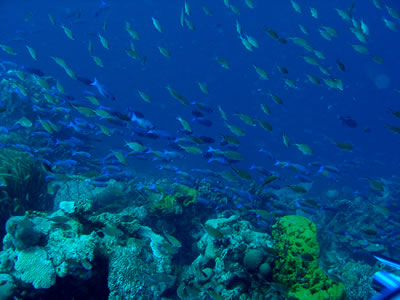Coral Ecosystems 
Multimedia
Lessons and Activities
Real World Data
Background Information
Career Profiles
Coral reefs are some of the most diverse ecosystems in the world. Thousands of species and millions of people depend on reefs for food and protection. Coral polyps, the animals primarily responsible for reef building, can take many forms: large reef building colonies, graceful flowing fans, and even small, solitary organisms. More than 6,000 species of coral are known, some live in warm, shallow, tropical seas and others in the cold, dark depths of the ocean.

NOAA Ocean Exploration: 2008 Bonaire Expedition
Because of the diversity found in the habitats created by corals, reefs are often called the "rainforests of the sea." About 25% of the ocean's fish depend on healthy coral reefs. Fishes and other organisms hide, find food, reproduce, and have their young in the many nooks and crannies formed by corals. The Northwest Hawaiian Island coral reefs provide an example of the diversity of life associated with shallow-water reef ecosystems. This area supports more than 7,000 species of fishes, invertebrates, plants, sea turtles, birds, and marine mammals. Deep-water reefs or mounds are less well known but also support a wide array of sea life in an otherwise barren world.
Benefits of Coral Reef Ecosystems
People receive many benefits from coral reefs. These ecosystems protect coastlines from storms and erosion; provide jobs for local communities; offer opportunities for recreation; and are a source of food and new medicines. Over a billion people eat fish caught from coral ecosystems. Fishing, diving, and snorkeling on and near reefs add hundreds of millions of dollars to local businesses. These ecosystems are also of great cultural importance to indigenous people in many regions of the world.
Threats to Coral Reef Ecosystems
Unfortunately, coral reef ecosystems are severely threatened. Scientists estimate that the world has lost 19% of its coral reefs with an additional 35% under the threat of being lost over the next 20-40 years. Some threats are natural such as diseases, predators, and storms. Other threats are caused by people, including pollution, sedimentation, unsustainable fishing practices, and climate change - which is raising ocean temperatures and causing ocean acidification. Many of these threats can stress corals, leading to coral bleaching and possible death, while others cause physical damage to this delicate ecosystem.
Educational Connection
Educators can use the resources in this Collection to teach their students about the science and beauty of corals. They can use these organisms and ecosystems to teach many scientific concepts including symbiotic relationships, reproduction strategies, food webs, chemistry, biotic and abiotic interactions, human impacts, etc. Additionally, educators can use corals to teach about conservation and stewardship of the environment. Even if you don't live near a reef, students can learn that they can help protect coral reefs in the U.S. and around the world. There are many actions, small and large, that you and your students can take to help conserve coral reefs.
Adapted from materials provided by NOAA's Coral Reef Conservation Program and National Ocean Service corals tutorial.
Features

Coral Reefs: Undersea Treasures Worth Protecting
Oct 2009 (NOAA)
Sediment runoff, and surges in algal cover, caused by nutrient pollution from land are among the main causes of injury to coral reefs....
Read More

Restoring Coral Reefs, One Gamete at a Time
Jan 2009 (NCRI)
Their mission was to collect the gametes, bring them back to the lab, and attempt to grow them into juvenile corals that can be transplanted back to damaged coral reefs....
Read More

Helping Threatened Corals Thrive: A Love Story
June 2010 (NOAA)
The circle of life - it's not just a song in an animated movie. For many NOAA researchers the circle of life starts with coral reefs....
Read More
